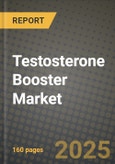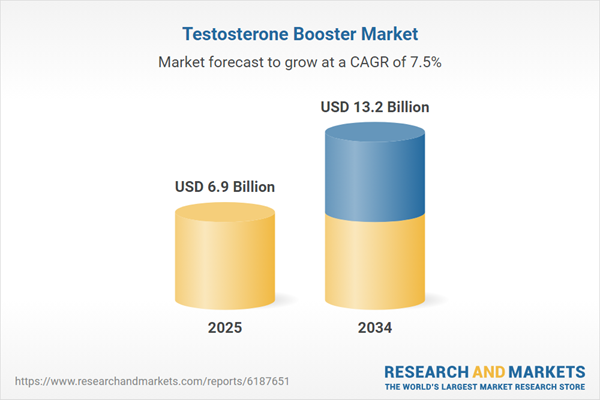The Testosterone Booster Market has witnessed notable expansion in recent years, driven by rising awareness of men's health, lifestyle enhancement, and age-related hormonal decline. Testosterone boosters, available in the form of dietary supplements, herbal formulations, and prescription therapies, are designed to help improve muscle mass, libido, energy levels, and overall vitality. The market is supported by growing fitness culture, increased participation in bodybuilding and athletic performance, and concerns around testosterone deficiency and late-onset hypogonadism. While the market remains largely unregulated in some regions, demand for natural and over-the-counter testosterone boosters continues to rise, especially among men aged 30-60. Consumers are increasingly looking for solutions that blend science, performance, and wellness benefits.
The testosterone booster market experienced dynamic changes with evolving consumer preferences and product innovation. The shift toward plant-based and adaptogenic ingredients, such as fenugreek, ashwagandha, and tongkat ali, gained traction as consumers sought safer, non-synthetic alternatives. Major supplement brands introduced combination products that addressed testosterone support along with stress reduction and cognitive enhancement. Online sales channels saw explosive growth, driven by influencer marketing and direct-to-consumer platforms targeting male wellness. Simultaneously, concerns around ingredient transparency and potential side effects prompted a regulatory response in several regions, with stricter labeling requirements and restrictions on claims related to hormonal benefits. The market also saw an influx of personalized supplements, offering testosterone support tailored to lifestyle, age, and genetic profiles.
The testosterone booster market is expected to mature further, with a growing emphasis on clinically validated ingredients, personalized nutrition, and digital health integration. Advances in biomarker testing and at-home hormone diagnostics will enable more precise supplementation strategies, while partnerships with telehealth platforms are anticipated to blur the lines between wellness supplements and medical-grade solutions. Regulatory oversight is likely to increase, especially in Western markets, prompting companies to invest in research-backed formulations and transparent supply chains. Consumer interest will continue to shift toward holistic men’s health solutions that encompass hormonal balance, metabolic wellness, and mental clarity. As aging demographics and proactive
Key Insights: Testosterone Booster Market
- Natural, plant-based testosterone boosters are gaining traction as consumers move away from synthetic or hormone-replacement options, preferring herbal ingredients like ashwagandha, fenugreek, and maca for holistic wellness support.
- Personalized supplements that use lifestyle data, DNA analysis, and hormone testing are being developed to offer customized testosterone support tailored to individual health profiles and goals.
- Digital platforms, including mobile apps and telehealth services, are increasingly integrated with testosterone booster programs, offering tracking tools, diagnostics, and remote consultations.
- Combination supplements addressing testosterone support alongside stress relief, cognitive function, and immune health are becoming more popular, reflecting consumer interest in all-in-one men’s health solutions.
- Transparency and third-party testing are now essential in building brand trust, as educated consumers demand proof of efficacy, clean labeling, and ingredient sourcing credibility.
- Increasing awareness of testosterone deficiency and its impact on physical, emotional, and sexual health is driving more men to explore over-the-counter testosterone support solutions.
- Growth in the fitness, bodybuilding, and active lifestyle segments is fueling demand for testosterone boosters that claim to enhance energy, muscle mass, and recovery.
- Aging global population, particularly in developed economies, is contributing to a rise in hormone-related health concerns, pushing the demand for natural and preventive supplements.
- Expansion of e-commerce and direct-to-consumer sales channels is making testosterone booster products more accessible, with targeted marketing strategies reaching a broader and more informed customer base.
- Regulatory inconsistencies and lack of clinical validation across many testosterone booster products pose a significant challenge, raising concerns about product safety, misleading claims, and potential side effects that could erode consumer trust and attract stricter oversight.
Testosterone Booster Market Segmentation
By Component
- Vitamins
- D-Aspartic Acid
- Zinc Component
By Source
- Mucuna Pruriens
- Ginseng
- Oyster Extract
- Fenugreek
By Application
- Hospitals
- Retail Pharmacies
Key Companies Analysed
- GNC Holdings, LLC
- Abbott Laboratories
- Pfizer Inc.
- Bayer AG
- MuscleTech (Iovate Health Sciences)
- Cellucor (Nutrabolt)
- EVLUTION Nutrition
- TestoFuel (Roar Ambition Ltd.)
- Force Factor LLC
- NOW Foods
Testosterone Booster Market Analytics
The report employs rigorous tools, including Porter’s Five Forces, value chain mapping, and scenario-based modeling, to assess supply-demand dynamics. Cross-sector influences from parent, derived, and substitute markets are evaluated to identify risks and opportunities. Trade and pricing analytics provide an up-to-date view of international flows, including leading exporters, importers, and regional price trends.Macroeconomic indicators, policy frameworks such as carbon pricing and energy security strategies, and evolving consumer behavior are considered in forecasting scenarios. Recent deal flows, partnerships, and technology innovations are incorporated to assess their impact on future market performance.
Testosterone Booster Market Competitive Intelligence
The competitive landscape is mapped through proprietary frameworks, profiling leading companies with details on business models, product portfolios, financial performance, and strategic initiatives. Key developments such as mergers & acquisitions, technology collaborations, investment inflows, and regional expansions are analyzed for their competitive impact. The report also identifies emerging players and innovative startups contributing to market disruption.Regional insights highlight the most promising investment destinations, regulatory landscapes, and evolving partnerships across energy and industrial corridors.
Countries Covered
- North America - Testosterone Booster market data and outlook to 2034
- United States
- Canada
- Mexico
- Europe - Testosterone Booster market data and outlook to 2034
- Germany
- United Kingdom
- France
- Italy
- Spain
- BeNeLux
- Russia
- Sweden
- Asia-Pacific - Testosterone Booster market data and outlook to 2034
- China
- Japan
- India
- South Korea
- Australia
- Indonesia
- Malaysia
- Vietnam
- Middle East and Africa - Testosterone Booster market data and outlook to 2034
- Saudi Arabia
- South Africa
- Iran
- UAE
- Egypt
- South and Central America - Testosterone Booster market data and outlook to 2034
- Brazil
- Argentina
- Chile
- Peru
Research Methodology
This study combines primary inputs from industry experts across the Testosterone Booster value chain with secondary data from associations, government publications, trade databases, and company disclosures. Proprietary modeling techniques, including data triangulation, statistical correlation, and scenario planning, are applied to deliver reliable market sizing and forecasting.Key Questions Addressed
- What is the current and forecast market size of the Testosterone Booster industry at global, regional, and country levels?
- Which types, applications, and technologies present the highest growth potential?
- How are supply chains adapting to geopolitical and economic shocks?
- What role do policy frameworks, trade flows, and sustainability targets play in shaping demand?
- Who are the leading players, and how are their strategies evolving in the face of global uncertainty?
- Which regional “hotspots” and customer segments will outpace the market, and what go-to-market and partnership models best support entry and expansion?
- Where are the most investable opportunities - across technology roadmaps, sustainability-linked innovation, and M&A - and what is the best segment to invest over the next 3-5 years?
Your Key Takeaways from the Testosterone Booster Market Report
- Global Testosterone Booster market size and growth projections (CAGR), 2024-2034
- Impact of Russia-Ukraine, Israel-Palestine, and Hamas conflicts on Testosterone Booster trade, costs, and supply chains
- Testosterone Booster market size, share, and outlook across 5 regions and 27 countries, 2023-2034
- Testosterone Booster market size, CAGR, and market share of key products, applications, and end-user verticals, 2023-2034
- Short- and long-term Testosterone Booster market trends, drivers, restraints, and opportunities
- Porter’s Five Forces analysis, technological developments, and Testosterone Booster supply chain analysis
- Testosterone Booster trade analysis, Testosterone Booster market price analysis, and Testosterone Booster supply/demand dynamics
- Profiles of 5 leading companies - overview, key strategies, financials, and products
- Latest Testosterone Booster market news and developments
Additional Support
With the purchase of this report, you will receive:- An updated PDF report and an MS Excel data workbook containing all market tables and figures for easy analysis.
- 7-day post-sale analyst support for clarifications and in-scope supplementary data, ensuring the deliverable aligns precisely with your requirements.
- Complimentary report update to incorporate the latest available data and the impact of recent market developments.
This product will be delivered within 1-3 business days.
Table of Contents
Companies Mentioned
- GNC Holdings LLC
- Abbott Laboratories
- Pfizer Inc.
- Bayer AG
- MuscleTech (Iovate Health Sciences)
- Cellucor (Nutrabolt)
- EVLUTION Nutrition
- TestoFuel (Roar Ambition Ltd.)
- Force Factor LLC
- NOW Foods
Table Information
| Report Attribute | Details |
|---|---|
| No. of Pages | 160 |
| Published | October 2025 |
| Forecast Period | 2025 - 2034 |
| Estimated Market Value ( USD | $ 6.9 Billion |
| Forecasted Market Value ( USD | $ 13.2 Billion |
| Compound Annual Growth Rate | 7.4% |
| Regions Covered | Global |
| No. of Companies Mentioned | 10 |









